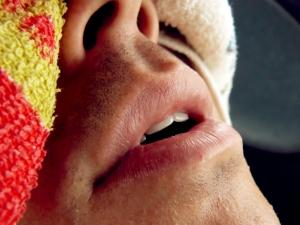How to Avoid Snoring on a Plane
 What most people don’t realize is that not only is the snorer annoying, but she or he could be at grave risk.
What most people don’t realize is that not only is the snorer annoying, but she or he could be at grave risk.
Snoring-on-a-Plane Just this past February a man snoring on a plane from Denver to Salt Lake City died. Passengers noticed the man snoring loudly. They said he appeared to move and then the snoring stopped. He stopped breathing. When they realized something was wrong, they began to administer CPR until the paramedics arrived on the ground. Unfortunately, the man died. While the cause of death has not been disclosed, snoring can be a sign of sleep apnea and can be indicative of a number of serious health risks associated with heart issues, strokes and various other medical conditions. While flying, snoring may exacerbate some of these issues. Why is this?
Sleep apnea snoring is usually characterized by a breathing disorder whereby your breathing intermittently stops while you are asleep. Snoring may be louder in those with severe obstructive sleep apnea and snorting may even occur which is a sign that your breathing has actually stopped and you are gasping for air. When you stop breathing, you are cutting off air and oxygen to your blood and vital organs, including your heart.
Several years ago, a study in Australia was conducted that evaluated breathing patterns and oxygen levels with people that were placed in a simulated flight environment. The conditions relative to oxygen and pressure levels were similar to those found on a commercial flight. Results showed that people with apnea experienced higher heart rates, physiological stress and demand for oxygen than did those of people considered healthy. The lead researcher in this study, Leigh Seccombe, said “we addressed obstructive sleep apnea because it is becoming so much more common as obesity increases and there are greater numbers of obese people on commercial flights.” The results suggest that patients with OSA (obstructive sleep apnea) have a higher risk for heart problems when they are snoring on a plane.
Preventing Snoring: Travel Tips While Flying
Actually, many people who snore dread flying. They are actually embarrassed and afraid that they’re going to disturb other passengers. Sometimes, they’re at a loss as to what to do. Here are some tips for those who snore while flying and those who are affected by snorers.
- If you are a snorer and especially if you use a CPAP machine, make sure you have a portable one that you can bring with you.
- Try to take daytime flights. You’ll be less tired and more apt to stay awake during the flight.
- Sit up rather than recline – especially in first class seats; if the seat reclines too far it’s like sleeping on your back and your throat muscles tend to relax and/or collapse making you more susceptible to snoring on a plane.
- Use a neck pillow to support your head.
- Drink plenty of water and stay hydrated. Dryness can make snoring worse.
- Don’t drink alcohol.
- Nasal strips might help open your passageways for greater oxygen flow.
And for those passengers who are affected by people who snore while flying? Two simple solutions: Noise cancelling headphones or ear plugs. Safe travels!
Check out our products section for anti snoring remedies that can help you during your travels.
Tags: preventing snoring, reduce snoring, Severe Obstructive Sleep Apnea, sleep apnea health Risks, sleep apnea snoring, Snoring while flying, travel tips for flying
Trackback from your site.
